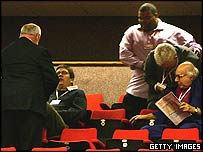On October 4th, 1992, at 18:35 in the evening, an El Al Boeing 747 freight plane landed on two flat buildings in Amsterdam South East, in the Bijlmer district. At least 43 people died in this disaster. It was a disaster that struck hard in the poor, close knit Bijlmer community, with many people losing nnot just a friend, family member or co-worker, but also their homes. A horrible tragedy, but nothing special: aircraft accidents do happen after all. However, there’s more to it than that…
Some months after the accident, rumours leaked out and were published in the newspapers about men in moonsuits having been on the accident site. Though later research would officially state that these rumours were just confused eyewitness reports about rescue workers, doubt kept existing about these sightings.
After the accident, the Amsterdam health care organisations arranged aftercare for the survivors of the disaster and the people living nearby. They started noticing that a lot of people came to them with strange physical complaints: sleeping disorders, chronical pulmonary infections, impotence, bowel and stomach pains. At around the same time, it became known that the Boeing carried depleted uranium as counterbalance weights; not unknown in airplanes but not very reassuring to the people suffering from those complains. Official reactions to questions about this stressed that no toxic, dangerous or radioactive cargo had been on board of the plane. However, what kind of cargo the plane carried exactly was still unclear. Officially it was all harmless stuff: fruit, perfume and “machine parts”, but there were other rumours.
Especially when it turned out that much of the cargo had not been checked, with not even the
documentation spot checked. Rumours that this cargo did contain dangerous elements therefore kept appearing. And then it became clear that the depleted uranium probably did release harmful toxins during the crash and resulting fire, with medical research done on survivors in march of 1998 showed they had higher levels of uranium in their bodies then was normal.
So what was El Al hiding and why did the Dutch government seem to support them in trying to cover
this up?
Well, we still don’t really know, though we do now know that the plane’s cargo was not as innocent as it first seemed. It’s only in 1999, seven years after the disaster that the whole truth becomes known. It turns out that there was some 6,5000 kilogram of dangerous substances on board, mostly flammable substances of one kind or another, as well as some toxic substances. Alos on board are two shipments of military cargo destined for the Israeli army. This cargo would largely consist of spare parts for DC3 cargo planes. More interestingly, the cargo also contained dimethyl methylphosphonate, a precursor chemical for the production of Sarin nerve gas… No wonder El Al tried to hide this.
All of this finally came to light during the parliamentary inquiry held in 1998-1999 (PDF report in Dutch here), after more and more had been reported or rumoured in the press and earlier inquiries. But is was only due to the consistent badgering by survivors and their supporters in the press and parliament (with my own party, the Dutch Socialist Party playing its part) that the inquiries came so far. If it had been for the then governments, El-Al and the aerospace establishment, all this would still be hidden.
Because that’s the default for the powers that be. With almost any disaster there will be hidden sides to the story, things They don’t want us, the public to know: because they fucked up, because of corruption or powerful commercial interests doing the wrong thing, deliberately or not. Politics will always play a role and if the victims are poor, they will be screwed over…
